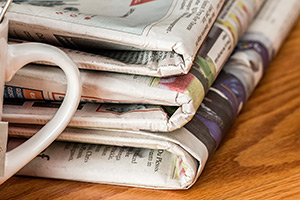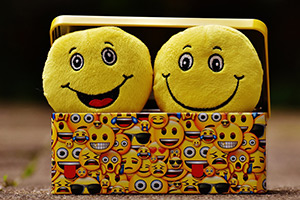Breaking The News: Behind-the-scenes on the topical comedy show
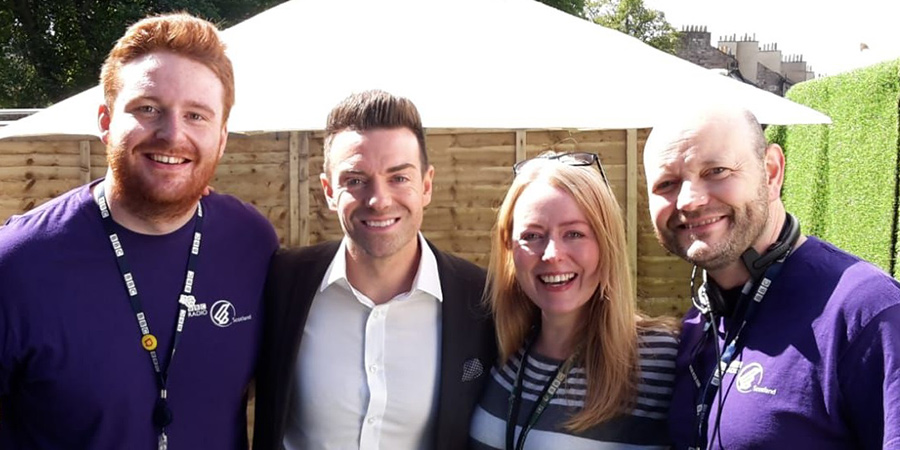
BBC Radio Scotland panel show Breaking The News has recently passed the 200 episode milestone. If you've never heard the show before, you really should tune in to hear Des Clarke and comedian guests riff on the week's stories, as the programme has become renowned as one of the funniest and sharpest topical comedy formats anywhere in the world.
To find out more about how the show is made, and how new writers can get involved in the format, we spoke to senior content producer and format co-creator Dave Flynn, producer Lauren Mackay and researcher and acting producer Chris Quilietti...
How did Breaking The News first come to be a project?
Dave: After the Scottish Independence referendum [2014], BBC Radio Scotland had to find new ways to engage with an audience that wanted to talk about politics and current affairs.
I'd spent my time working on a variety of comedy and entertainment programmes and, just prior to BTN, I was running the morning topical phone-in show which was a lot more straight news.
The head of Radio Scotland at the time, Jeff Zycinski, asked me to come up with a new comedy vehicle - it could be sketch, panel, parody - anything - but the title had to be: Breaking The News.
So, along with James Christie and Keith Martin, we came up with almost the panel show format we have today. It has evolved and morphed as time has gone on.
I'd worked with Des before on loads of different things and knew that he shared my passion for news, politics and, of course, comedy; so he was the perfect fit as host.
As I got my break at the BBC 20 years ago as a sketch writer, I was determined that we make it a vehicle for up-and-coming writing and performing talent, as well as established stars.
We trialled the hell out of the format from office run-throughs to improvised play at The Stand comedy club and it really paid off, as we hit the air almost fully formed and sounding like we'd always been there.
So, tell us more about your roles...
Dave: We're a small but perfectly formed core team and we take on a variety of roles. Essentially I'm the showrunner and work with my producer Lauren and researcher Chris to plan, cast and editorialise every episode.
I also co-edit the programmes for radio and produce the TV edits - looking at the tone, pacing and rhythm of each show whilst also adhering to the BBC Guidelines for compliance - the radio edit is pre-watershed, and TV is post.
In the run up to each series we also organise the venues, crew and audiences and book the guests and lead writers.
Lauren: As producer, my main duties are casting, booking writers, overall content, studio/OB producing the shows, speaking to guest, scripting, editing and delivering the show.
As the producer of Breaking The News, you are never really 'off'. The news doesn't stop at weekends! You never know when a previous story might inform a current one so being across national and international news is crucial.
Aside from recording the show, my favourite part of the job is editing. To me, it is the truly creative part of the process. I have this huge piece of audio that I have to cut down but it's not as simple as just chopping material out. It's moving things around so the pace of the show is right, or putting a gag in a different place so it flows better. I feel like I am painting a picture with the audio I have - I genuinely love it!
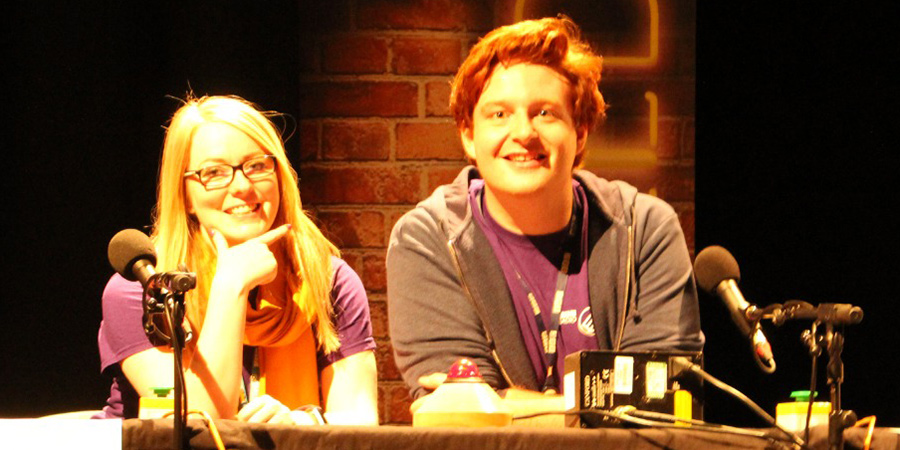
Chris: I'm the researcher on Breaking The News, so broadly I support the producers to make the show each week, and that involves wearing a couple of different hats. A production/ logistics hat for transport, accommodation, schedules, bookings and a lot of other organisational things that keep us ticking over week to week. The other side of my role is more focused on content. Pitching ideas and devouring the news each day, including about every local paper in Scotland, for things to use... I consume an arguably unadvisable amount of news each week when we are in production.
When a series is actively on air, what does your week look like?
Dave: Mondays we look back at the previous week and get the paperwork done and start to look at the news coming out of the weekend cycle.
Tuesdays we have our first big planning meeting and start to work out the teams and the content for the rounds:
Round 1, The Broken News - a mash up of two major news stories of the week.
Round 2, Pubic Opinion - we cover two opinion pieces of the week which two celebrity guests describe for us.
Round 3, Mystery Voice - looking at two people who have made the news.
Round 4, News In Numbers - questions from stats and percentages in the news.
Wednesdays we have our final production meeting to ensure all the arrangements are in place for the recording, the guests and the audience. We also finalise our rounds and the subsequent briefing notes for Des and the panellists. I also then make the mash-up audio from two different news reports to give us our signature opening round.
Thursdays are recording day. From early on I work in conjunction with Keiron Nicholson, our script editor, to go through the material we've been sent in and get it down to a shortlist of gags for a read-through.
When Des arrives, we have the gag read-through and then he and I go through the script adding gags in the most appropriate places.
We have a quick tech run through then get the audience in and I do a very lowkey warm-up/audience information bit where we grab some clean applause.
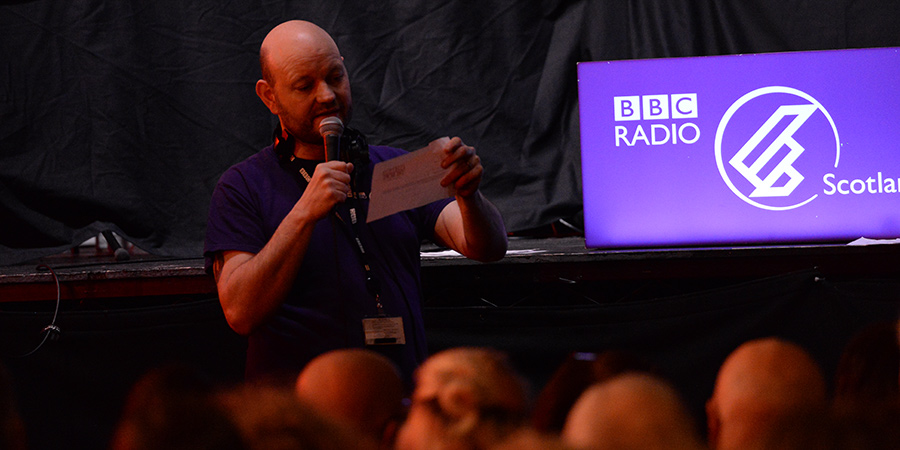
We then record and, after the recording, Lauren and I head back to base and do our first pass edit to get the audio down to around 35 mins.
Fridays are a final polish edit down to 28 minutes, compliance and delivery for playout at 1.30pm.
Lauren: Mondays are about looking back at the news that has come out since the show aired last Friday. It's also the day we do all of our admin/payments/make sure everything is sorted for Thursday's recording etc.
Tuesdays are when we get together and discuss what we want to talk about on the show that week. I usually come armed with at least half of the show already in my head and many more ideas but me, Dave and Chris spend a good amount of time talking about where things should sit and how to approach each story. What do we want to get out of each story and where do we think the laughs will come from? I then type up the first draft of our writers brief and send it out.
On a Wednesday we finalise the show content - move things about, add in any news stories that have come out overnight and update the brief for the writers. I also speak to all the panellists about what we are doing and update Des. Then I start writing the script. Chris sends me the audio he has grabbed and created for each round so I can listen to it and choose what to use.
Thursdays are normally an early start to pull everything together before the recording. We go through gags that are being sent in (Keiron does the majority of this now - it used to be just us - but we all still help as much as we can) and they get collated for our read-through. Des reads the gags to us, and the ones that worked or that we think have potential, get added to the script. It's a quick turnaround as we then record the show.
As soon as we are done, I take the audio straight into the edit and start cutting! Me and Dave do the edit ourselves so we cut half of the show each and finish when we get to roughly a combined 35 minutes. Then it's back in early on Friday morning to get it down to 28 minutes and finesse everything. The show goes out at 13:30 and we normally deliver it anywhere between 11:45 and 12:45, which is pretty close to the wire! After that, I create and deliver the podcast. Then it's a look ahead to next week's show, replying to emails etc before finishing for the week.
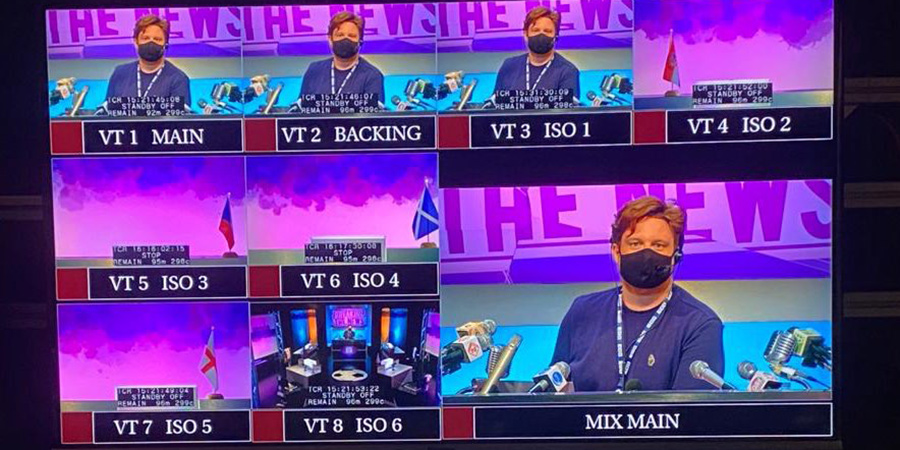
Chris: When we are on air, it is like time travel. Weeks go by in the blink of an eye and, before you know it, Christmas and we are booking people for the next run.
For me, Mondays tend to be clearing up from the week before, tying up paperwork, who got material on and anything other business that has to be wrapped up before we can dive into the new week. I'll also pull together all of Monday's news and the news that we missed post last week's record and over the weekend as well as start to set things up for this week's show.
Tuesday is when we first get our teeth into the bones of this week's programme. I'll have collated as much of the mornings news as I can ahead of our first meeting and we will hash out what a show would look like knowing what we know on a Tuesday. Then we will get a provisional brief out to the writers to give them an idea of what we are thinking.
Wednesday starts the same, usually locking in (as locked-in as a topical show can be) the stories and getting the ball rolling on briefs for writers and the panel. My day involves gathering all the audio for the programme; Interviewing whoever I've booked to be our public opinion voice that week, and editing them down. Finding clips of out mystery voices and of course our klaxon... the klaxon is often the hardest thing to find each week. It's either obvious because of some flub a politician has made, or I'll be searching high and low; but we do always find one.
Thursdays can be long days, especially if we're on the road. First thing I'll do is gather as many what we call 'liners' from overnight and send them to the writers early. Liners are usually the top-line of a breaking story or an update to existing story's we're talking about in the show. This is so we can cram as much topicality into each recording. There have been times I've sent lines out awfully close or during the record because a story has broken, and we want to try and include it. Once we get through the gag-readthrough and we're at the venue I'll get the place ready for our panellist to arrive, check on their travel if they are coming up or down from anywhere, and make sure they are welcomed and have everything they need. I'm also the person you usually see in the aisle at the start of the recording taking pictures to use online.
Fridays for me are focused on social media and keeping an eye on the news, in case anything dramatically changes in one of our top stories.
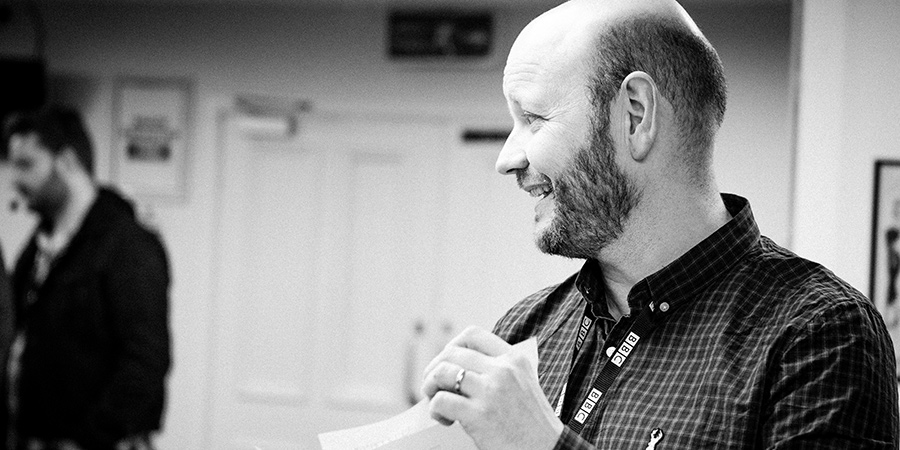
How is the submitted written material filtered down?
Dave: Keiron does the heavy lifting which I then jump into on a Thursday and sometimes, given the volume of material, Chris and Lauren assist here too.
Then we whittle these down to a read-through; roughly 8 -10 pages of jokes written specifically for the rounds and 8-10 pages of topical openers and closers.
Des and I then edit the subbed gags, as we put them into the script.
Even then, jokes that may have been recorded on the night may or may not make the final edit as we have to get the programme to time, whilst also servicing the material that the performers and Des himself have brought to the table.
As you're a topical show, presumably you have to think about issues such as political balance when picking what to use?
Lauren: There are a lot of things I have to consider when thinking about what jokes to use. Political balance is particularly important when we are in an election period for example. We have to be fair and "spread the love". We also have to be reflective of current affairs, and are driven by the news each week. We don't want to do the same stories every week, but with the big ones that won't go away it is about looking for the newest angle on it.
Chris: From a research perspective, it's something I'm conscious of when trawling newspapers and websites for news, so I gather material from a broad range of publications and online sources.
Dave: It's not just political balance across the parties but given the unique properties of a Scottish parliament working in parallel with Westminster, we have to look at a much broader spectrum. We often go for a mixture of big Scottish stories and also UK and worldwide news with a uniquely Scottish viewpoint.
I also think, particularly with satire, you have to punch upwards and never go for the little guy when there are larger bodies to be held to account.
There are also challenging stories simply too big to avoid such as the global pandemic where, again, we have to find the human elements and question those who may be accountable rather than looking at the bleaker side.
The show also sometimes appears on TV. How does that commissioning work, and how does the show differ on those weeks?
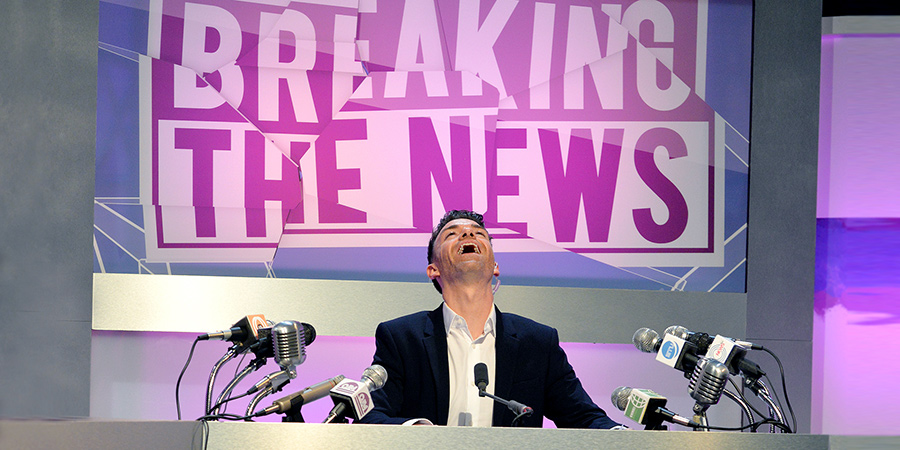
Dave: Breaking The News has consistently been one of the most requested programmes on BBC Radio Scotland's digital platforms. Our popularity was such that, in 2019, a televised version helped launch the BBC Scotland channel; making it BBC Scotland's first truly multi-platform offering - television, radio and podcast.
We were originally commissioned as a TV series which ran in parallel with the radio series [Series 12] - so ten episodes per run. As we've gone into and out of the pandemic however, Breaking The News has evolved into two distinct models - occasional specials around big events such as The Euros and COP26 and Breaking The Year, our annual look back at the stories that made the year.
Lauren: Although the show is a filmed version of what we already make for radio, the production is much bigger when on TV. The day is longer for the guests (make-up etc) and there are technical things that are slightly different. As the producer, the main difference is keeping an ear and eye across the show and making sure we have enough material for both TV and radio. I often think to myself "ah, that gag will be great for TV but won't work on radio" so I need to be mindful that I will need something different for the radio cut. Once I know I have enough for both, I can move on to the next topic/round.
Chris: I turn into a TV researcher, so for example, the public opinion contributors are filmed rather than just collecting audio. On top of that, I get to focus a lot more on content, as an excellent production manager tends to take planning and logistic off my hands. During the TV series, I would often produce the radio show along with another producer, to let Dave look after the TV version.
Dave: It's been a steep learning curve but BTN on TV is just a much larger canvas to play with and also gives us the opportunity to do slightly more adult material, as our TV episodes are shown post watershed.
It's funny that we can do the radio show with 5 of us on the production team which then blossoms to around 25 people for TV.
It's a brilliant opportunity to expose the audience to a whole range of Scottish and local performing and writing talent that they haven't seen or heard before.
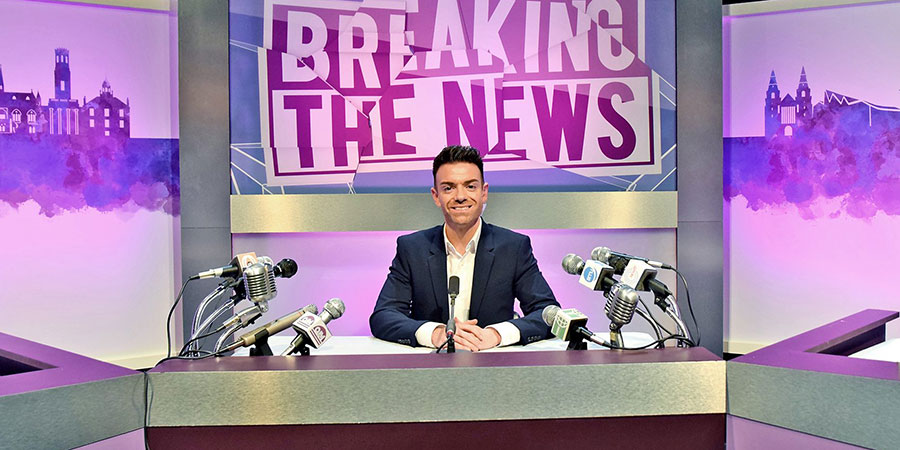
Do you over-record and then pick what to use in the edit? Or is what we hear/see on air pretty much all that was recorded?
Lauren: I am sometimes glad you don't hear/see everything that is recorded, because our panellists can be very naughty (and very funny with it). We could do with a late-night version of the show! We record about 1.5 to 2 hours, to get it down to 28 minutes. There are so many reasons that material doesn't make it but sometimes you do have to cut gems just because of time.
Dave: In general, we always get more than enough brilliant material which was another great selling point when it came to pointing out we could cut a TV show and a radio show from the same cloth.
So, what are you looking for in writers?
Lauren: It's terribly obvious to say, but we want people who are funny. If you think you can write a gag then give it a go. If you love the news then that's great for us - if you find that you spot the absurdities and fun in news stories then you might just have what it takes to get a gag on. For me, the biggest pitfall is when someone clearly hasn't listened to the show and sends in jokes that we would never use. Often it is gags that are too rude/mean or just tonally don't fit.
Dave: Know the tone, don't go for the most obvious joke - everyone else will - and know your host. The amount of times we get unusable gags about Des's wife and kids or his drinking habits - Des isn't married, has no children and is teetotal.
We went through a period of writers sending us material about Des committing all these weird crimes (who knows?) and/or him being evil or comically cruel so we invented an uncle for Des that we could shift the gags onto, which allowed to keep some very funny jokes that otherwise would be unusable.
200 episodes is quite a milestone! What have been your top highlights from your time working on the show?
Chris: It's been a long road with me and Breaking The News. I worked on the first series as a runner on the recordings, helping with audiences and teas, now I'm the full-time researcher and acting producer, so to pick one highlight is hard.
The Edinburgh Festival shows are always a standout for me, the energy of the place just lifts everyone up and the audiences are present and can be the most rewarding.
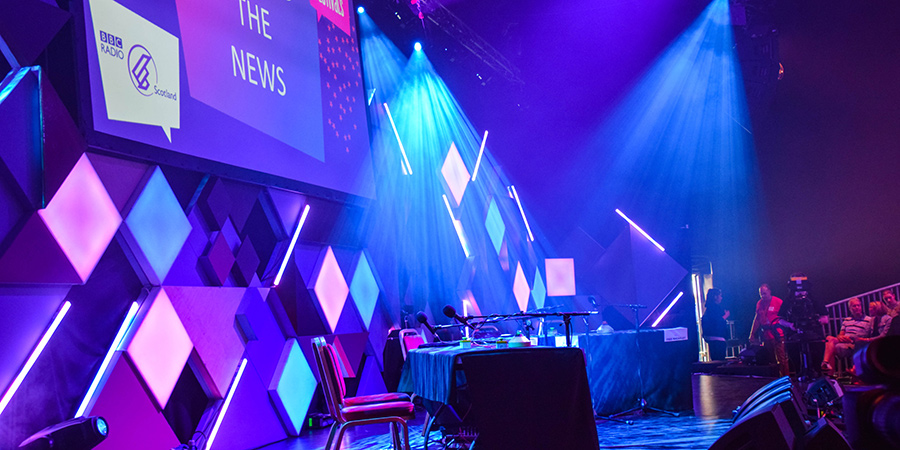
Truly the best thing is getting to work with the most brilliant and talented core team as well as some of the best professionals in the industry week in and week out. From writers who constantly punch up their game to engineers who work magic, and comics who make me greet with laughter. It's a joy.
Dave: There are so many to be fair... That first show in front of a small audience at The Art School in Glasgow and realising we were really onto something special; hearing and feeling a big laugh ripple round an audience of 350 people at the Edinburgh Festival; picking up our 5th consecutive Best Radio Show award at the Scottish Comedy Awards; the first time one of our social media clips got over a million views; and sitting at home watching a show I'd helped bring to life now suddenly on my TV. I'm also really proud of our drive to have 50/50 male and female panellists years before most mainstream panel shows even regularly had a single female guest.
Lauren: Honestly, far too many. It's a joy to work on. I really can't choose: filming our first TV episode after all of the work that went into getting that commissioned; watching Des's mind work faster than you would think was humanly possible (he's a joke machine!); genuinely thinking I was going to go into labour because I was laughing so much producing recordings while heavily pregnant; getting to give some of the funniest people ever a radio/TV gig for the first time; watching writers develop from getting one or two gags on per series to being lead writers; and, of course, getting to work with people I now consider to be like family. It's without a doubt the best team in radio!
And what about any challenges/stresses?
Dave: It's an old saying but comedy really is a serious business.
It can be really stressful to have at times, three different productions going on - like 2019, when we had a Xmas TV special recorded the same week as a regular radio show and also needed to put together a Best Of for New Year programming.
We also work to really tight self-imposed deadlines from recording to broadcast to keep the topicality fresh.
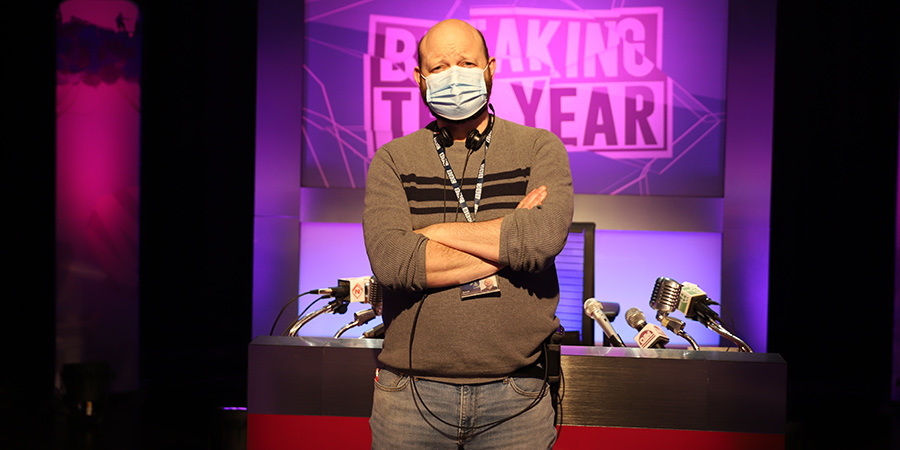
BUT... and it's a huge but... we don't fight fires or perform lifesaving surgery. We do our jobs with a huge sense of perspective.
I've been blessed to work with teams that all have funny bones. Comedy is in our blood and I always have an unshakeable faith that the laughs will come, and they do in bucket loads.
The shows are a joy to record, not a chore and every audio engineer, cameraman, floor manager, make-up artist or audience handler we've ever had have told us how much they've enjoyed working on the programme.
Lauren: I am a big fan of putting our challenges and stresses into perspective by reminding everyone that we are not surgeons. If something goes wrong we can fix it. I don't get stressed out when it comes to work because there is always a solution. Saying that though, I was off on maternity leave during the start of the pandemic/lockdown recordings so the rest of the team had to deal with it without me there... so they might have a different answer to this one!
Chris: The show can have its usual stresses and strains, but that's the nature of what we do. With more experience, I'm easier on myself for things that don't work out or go wrong that I can't control because... I can't control them.
2020 was quite the year. Whenever I'm asked what it was like making the show in lockdown, I usually start by saying 'you know in that first show of 2020, we didn't talk about coronavirus... And it quickly crept up to the top story by Week 3.'
Once it hit, I found myself as the fulltime producer for most of 2020. A challenge I did not expect, but I manged to stay afloat in the deep end of that pool and I am immensely proud of the work we did adapting the show and keeping it going. It proved to be a real tonic for me personally as well as a professional challenge.
Dave: Coronavirus was a big challenge. 2020 demanded that we all adapt to a new way of working; and we were no different. Mid series venues closed, audiences disappeared and, as lockdown tightened, our guests and production team couldn't be in the same room. But what remained was my determination to keep the show on air, despite, it has to be said, a genuine pressure to replace us in the schedule with rolling news.
Editorially, the challenge was about striking the right tone amid an increasingly grim news cycle while also offering our loyal listenership a recognisable dose of fun and humour.
Everyone had to be remote, so delays on the line would lose the rhythm of the show and kill punchlines, so I opted for an app used by our news teams to provide a broadcast quality line.
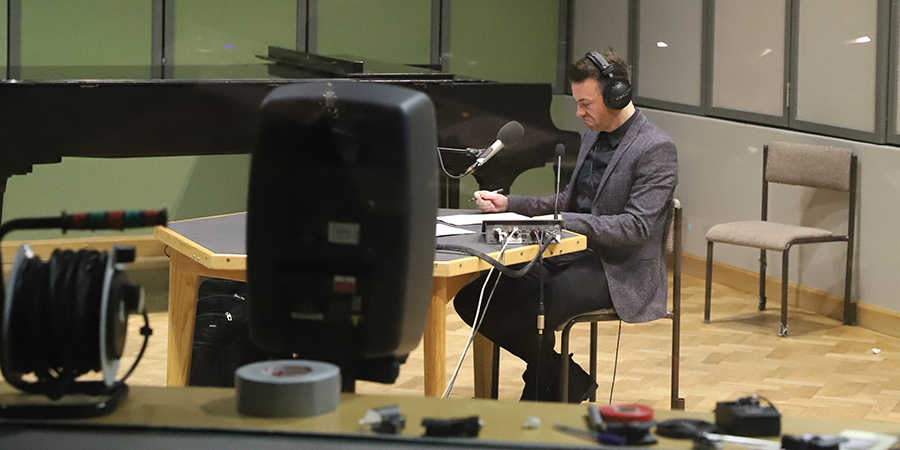
Our guest bookings had to change too. I immediately dropped our 'opinion' guest and went for four comics - the industry was decimated, so it was our way of giving something back to the people who had driven the success of the show.
There were new challenges for the guests too, as we realised that the lack of audience necessitated contributors who had great material, but also had to be willing to give more of themselves.
The remote recording model has also meant that we were able to introduce some bigger names and new voices from around the world telling us how lockdown had been for them.
Without a varied news agenda, we adapted to 'the only story in town' by focussing on the very human experiences we were all going through: from home hairdos to home schooling.
And while we missed our live recordings, the programmes had a warmth and sense of community that make them some of my favourites.
At a time when it would have been easier to take us off air, we were afforded the opportunity to reinvent ourselves, redefine our content and keep lifting the nation's spirits. I'm very proud of what we managed to achieve.
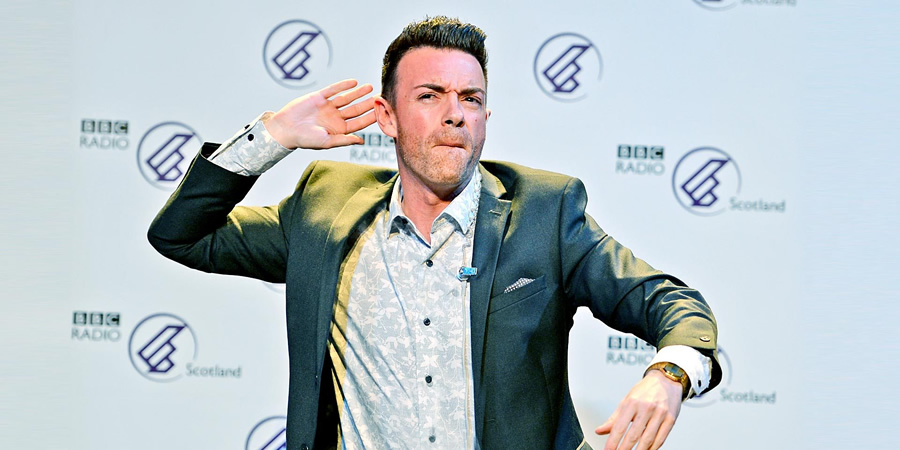
So, if someone reading this is interested in writing for the show, how do they get involved?
Lauren: We have a huge pool of writers who get sent the brief every week and are welcome to send in material as and when they can. If you think it is for you, then get in touch: btn.production@bbc.co.uk
Breaking The News is on BBC Radio Scotland on Fridays at 1:30pm, or listen anytime via BBC Sounds
See also: Breaking The News writing tips
This article is provided for free as part of BCG Pro.
Subscribe now for exclusive features, insight, learning materials, opportunities and other tools for the British comedy industry.


